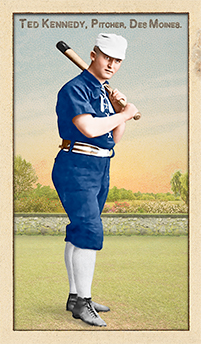
- Series: Beginnings: 1880's
- City: Des Moines
- Team: Prohibitionists
- League: Western Association
Theodore A. Kennedy (1865-1907) was an ill-starred young pitcher who learned from the best, executed effectively and, as so many of his era, flamed out early with a ruined shoulder. In our day, with Tommy John surgery nearly a rite of passage for aspiring big-leaguers, it is sobering to consider the plight of the young men of the 19th century who were thrown into unrelenting action and treated as disposable cogs in professional baseball's juggernaut. Such was the lot of Ted Kennedy. As a youth, he was ball boy in Peoria studying the not-yet-Old-Hoss Charlie Radbourn, the star pitcher for the town's very fine amateur squad. Radbourn was said to have been the first to master the overhand curve delivery that would carry him to greatness with Providence years later. Radbourn showed Ted the grip and Ted worked hard to learn it. He emerged in mid-west circles as one of the most promising young pitchers in 1884, a year of turmoil in the major leagues that left minor league teams scrambling for talent. The next season Kennedy got his break when Cap Anson brought him to Chicago. The Chicago Tribune's June 12 edition reported: “The Chicago team will place a new man in the pitcher's box today—Ned Kennedy, until recently with the Keokuk nine, and looked upon as one of the strongest unengaged pitchers in the country.” Ted's astounding strikeout record had made that reputation. Before the call-up, his highlight was 24 Ks, including 17 straight, in a game with no putouts by the first baseman against Burlington in October of '84. Sadly, Ted's arm didn't survive his rookie year. After hurling three games in two days, his shoulder gave out. Though he pitched one more year in the majors and a few in the minors, he was never the same. Kennedy later remembered, "I was terribly lame - had to pitch underhand. Every game I pitched that season it was like a rusty knife was being thrust into my shoulder."
- In retirement, Kennedy found a lucrative career in sporting goods, eventually selling out to the Spalding empire but continuing to teach youngsters how to throw the curve
- Ars Longa is indebted to the research of SABR's Craig Lammers for much of this bio
- Kennedy's uniform color on this card was changed in July, 2017 from black to blue to reflect recent reliable research by Craig Brown & friends at Threads of Our Game. One card was previously released featuring a black uniform.
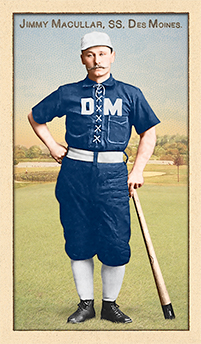
- Series: Beginnings: 1880's
- City: Des Moines
- Team: Prohibitionists
- League: Western Association
James F. Macullar (1855-1924) was a scrappy fellow with several noteworthy accomplishments. At a mere 5'6” Little Mac did not cut an imposing figure when he arrived in major league baseball by virtue of his Syracuse Stars being promoted into the National League in 1879. Macullar was the rare natural left-hander to bat right-handed, but any advantage accruing wasn't obvious as he generally hovered around the .200 mark at bat. It was in the field that he distinguished himself. By the end of his career, Macullar had set a record that still stands by playing more games (325) at shortstop than any other southpaw. That rookie season also saw Jimmy demonstrate leadership beyond his years when the twenty-four year old was given the management of the Stars for about a month. His weak hitting left him unemployed for a couple of years, but that didn't deter him from baseball. He and teammate Hick Carpenter headed to Cuba in the winter of '79-80 and became the first North Americans to play for the new league when they were signed by Colón. Despite Jimmy's limitations, he and Hick far outclassed the fledgling Cuban players and were so dominant that other teams refused to play against them. Macullar was hired by the new American Association's Cincinnati franchise in '82 and played stellar centerfield for the pennant-winners with his buddy Carpenter at third. The next season he was relegated to a utility role and his poor offensive production led to his demotion. Picked up by the Orioles, Jimmy saw regular action back at short through the 1886 season.
- Baltimore became Macullar's home and he served the city as a jailer over the next two decades.
- Jimmy contributed an outstanding play in centerfield to nail the White Sox' Abner Dalrymple at home to end the Reds' first post-season contest on October 6, 1882
- Macullar's uniform color on this card was changed in July, 2017 from black to blue to reflect recent reliable research by Craig Brown & friends at Threads of Our Game. One card was previously released featuring a black uniform.
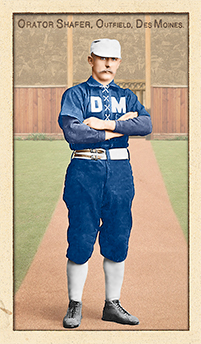
- Series: Beginnings: 1880's
- City: Des Moines
- Team: Prohibitionists
- League: Western Association
George W. Shafer (1851-1922) still ranks tenth all-time in outfield assists. The right fielder extraordinaire also continues to hold the single-season record with 50 runners cut down in 1879. Known for jawing at himself out in right if he didn’t have an umpire nearby to harangue, “Orator” was far from all talk. He had great seasons at bat and perennially ranked among the best outfielders of his day. Shafer began with the Hartford Dark Blues of the NA in 1874. Like many in the early decades of baseball, he moved around a lot. By the time he returned for a second stint with the Athletics in 1890, he had played for ten teams in 14 years. He had a great year at bat for the Indianapolis Blues in ‘78 where his .338 average was sixth in the NL. Four times he led the league in outfield assists. Orator was a key member of Cap Anson’s White Stockings, batting .304 the year he set the assist record. From 1887-89 the volatile Shafer made his living with minor league squads where he hit well and also drew a suspension for decking an umpire.
- Shafer’s final ML season was back in Philly where he was joined by younger brother (Zachary) Taylor at 2nd base
- Orator had an even 1,000 hits, good for a lifetime .282 average
- Shafer’s uniform color on this card was changed in May, 2017 from black to blue to reflect recent reliable research by Craig Brown & friends at Threads of Our Game. Two cards had been previously released featuring a black uniform.
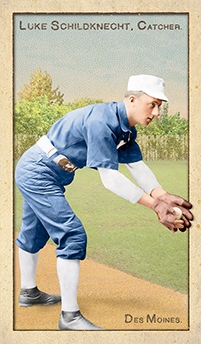
- Series: Beginnings: 1880's
- City: Des Moines
- Team: Prohibitionists
- League: Western Association
Luke Schildknecht was a minor league catcher in the late 1880s in the midwest. Photographed by the Old Judge crew for their 1888 series, Luke appears in three known poses in a Des Moines uniform. The Baseball Encyclopedia lists Luke on the 1888 Des Moines Prohibitionists' roster, playing 26 games with a .237 BA. They indicate the same stat line for the ’88 Sioux City Corn Huskers, which had taken over the Des Moines club mid-season. Interestingly, only three players on that team lack personal data, with Schildknecht and battery mate Frank Wells being two of them. The tandem seem to have arrived and left the team at about the same time.
Dennis Pajot’s The Rise of Milwaukee Baseball documents that the Cream City team signed both Schildknecht and Wells prior to the 1889 season. However, Schildknecht is listed as the fourth-string catcher for the squad and does not appear in the historical record for the team at any time. Despite not making the team in Milwaukee, the Old Judge editors changed Luke's team designation from Des Moines to Milwaukee and continued to use the Milwaukee designation on Luke's cards throughout the rest of the Old Judge run.
- Yep, I was confused too. Took me a few years to realize that the uniform Luke is wearing in this image is a Des Moines uniform. Reversing the trend that the Old Judge guys started 128 years ago, I changed Schildknecht's team designation on this card in September, 2017, from Milwaukee to Des Moines. Balance is restored. Six cards were previously released with the Milwaukee team designation.
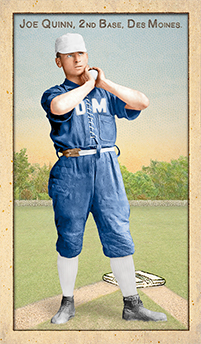
- Series: Beginnings: 1880's
- City: Des Moines
- Team: Prohibitionists
- League: Western Association
- Hall: Baseball Australia Hall of Fame
Joseph James Quinn (1864-1940) came a long way to play baseball for the Dubuque Rabbits. And it would be over a century until the next Aussie made the trip to the big leagues of America. Joe quickly advanced to that level with the Union Association’s St. Louis Maroons in 1884. Joe brought his working-class background to the ballpark and soon became one of the mouthpieces for players in an era when they were chattel. “Ol’ Reliable” was a leader in the Players’ League revolt in 1890, an interruption in Joe’s long National League career, primarily in Boston and St Louis. He had another memorable detour when called upon to take the “worst job in baseball” managing the doomed Cleveland Spiders in 1899. When owners shipped out Cy Young, Jesse Burkett, Bobby Wallace and others to their St. Louis Perfectos, Quinn was left with the unenviable task of shepherding the lousiest team in history to a 12-104 record. Even in defeat, Joe’s men followed him, a tribute to his character.
- In 1893, The Sporting News awarded Joe a gold watch as “the most popular player in baseball”
- Elected to Australian Baseball Hall of Fame: 2013
- Quinn's uniform color was changed in August, 2017, from black to blue to reflect recent reliable research by Craig Brown & Friends at Threads of Our Game. Six cards were previously released featuring a black uniform.




